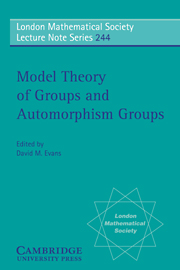Book contents
- Frontmatter
- Contents
- Preface
- Introduction
- Finite Covers
- Definable subgroups of algebraic groups over pseudo-finite fields
- Groups in pseudofinite fields
- The group of automorphisms of the field of complex numbers leaving fixed the algebraic numbers is simple
- The automorphism group of the field of complex numbers is complete
- The algebra of an age
- Elimination of inverses in groups
- Model-theoretic properties of polycyclic-by-finite groups
- Non-standard Free Groups
- Finitely generated subgroups of the free ℤ[t]–group on two generators
- Rings of definable scalars and biendomorphism rings
- Recent results on simple first-order theories
Model-theoretic properties of polycyclic-by-finite groups
Published online by Cambridge University Press: 18 May 2010
- Frontmatter
- Contents
- Preface
- Introduction
- Finite Covers
- Definable subgroups of algebraic groups over pseudo-finite fields
- Groups in pseudofinite fields
- The group of automorphisms of the field of complex numbers leaving fixed the algebraic numbers is simple
- The automorphism group of the field of complex numbers is complete
- The algebra of an age
- Elimination of inverses in groups
- Model-theoretic properties of polycyclic-by-finite groups
- Non-standard Free Groups
- Finitely generated subgroups of the free ℤ[t]–group on two generators
- Rings of definable scalars and biendomorphism rings
- Recent results on simple first-order theories
Summary
If R is a (possibly noncommutative) ring, then, by [P, Corollary 2.18, p. 37], any R–module M is characterized up to elementary equivalence by the invariants, where and ∣φ(M)/(φ(M) ⋂ ψ(M))∣ ∈ {1, 2, …, ∞}, are positive primitive formulas with one free variable. Some algebraic invariants which characterize abelian groups up to elementary equivalence, and which can be written in the form ∣φ(M)/(φ(M) ⋂ ψ(M))∣ had been previously given by W. Szmielew and by P.C. Eklof and E.R. Fisher (see [EF]). The two following consequences are easily proved:
1) Two abelian groups, or two modules, M,N, are elementarily equivalent if and only if they satisfy the same sentences with one alternation of quantifiers.
2) For each integer n ≥ 2, two abelian groups, or two modules, M, N, are elementarily equivalent if and only if the direct product of n copies of M and the direct product of n copies of N are elementarily equivalent.
For nonabelian groups in general, it is not possible to obtain such a characterization of elementary equivalence, since S. Burris proved in [Bu] that, for each integer n, there exist two soluble groups which satisfy the same sentences with n alternations of quantifiers without being elementarily equivalent. Concerning 2), L. Manevitz proposes the following problem in [Mn, p. 9]:
Conjecture.For each integer n ≥ 2, two groups M,N are elementarily equivalent if and only if the direct product of n copies of M and the direct product of n copies of N are elementarily equivalent.
- Type
- Chapter
- Information
- Model Theory of Groups and Automorphism Groups , pp. 144 - 152Publisher: Cambridge University PressPrint publication year: 1997

